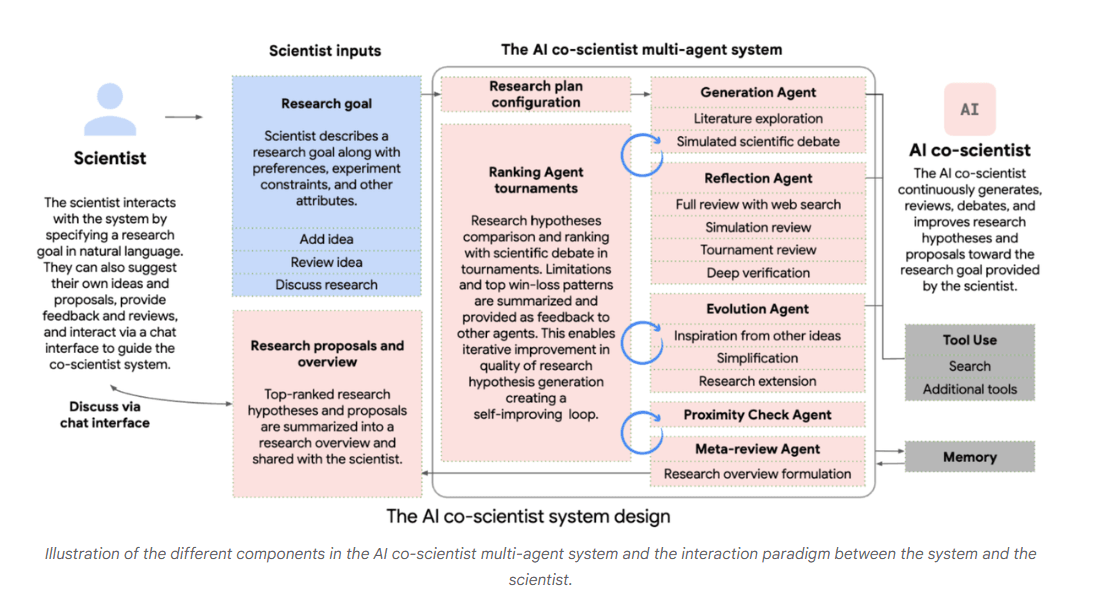Accelerating Scientific Breakthroughs with an AI Co-Scientist by Google
Innovative AI co-scientist powered by Gemini 2.0 is revolutionizing research by combining human ingenuity with advanced machine learning capabilities.

AI Research Assistant
Analyze this article instantly
In today’s fast-paced scientific landscape, artificial intelligence is emerging as a game changer. The innovative AI co-scientist is revolutionizing research by combining human ingenuity with advanced machine-learning capabilities. Powered by Gemini 2.0, this multi-agent AI system accelerates discovery, streamlines hypothesis generation, and empowers researchers across disciplines.
Transforming Research with AI
Traditional scientific research often grapples with the overwhelming growth of literature and the challenge of integrating insights from diverse fields. The AI co-scientist addresses these issues by mimicking the scientific method. Its design allows for:
Automated Literature Review: Efficiently synthesizing vast amounts of research to form a solid knowledge base.
Novel Hypothesis Generation: Leveraging a coalition of specialized agents—Generation, Reflection, Ranking, Evolution, Proximity, and Meta-review—to propose innovative research directions.
Iterative Improvement: Utilizing test-time compute scaling and recursive self-critique, the system refines hypotheses through self-play debates and ranking tournaments.
This blend of automated analysis and adaptive reasoning positions the AI co-scientist as a powerful tool for modern researchers.

Source : google Research
Also Read: The AI Coaching Breakthrough in ChatGPT
How the AI Co-Scientist Works
At the heart of the system is Gemini 2.0, which serves as the virtual scientific collaborator. Here’s a breakdown of its operation:
Goal Parsing and Research Planning: A supervisor agent deconstructs a scientist’s research goal into a detailed plan.
Specialized Agent Collaboration: Each agent contributes to generating, evaluating, and refining hypotheses, ensuring a robust and dynamic research output.
Elo Auto-Evaluation: By applying an automated Elo metric, the system continuously measures and improves the quality of its outputs, correlating higher ratings with increased accuracy and novelty.
This self-improving cycle not only expedites discovery but also enhances the reliability and creativity of the generated hypotheses.
Also Read: Digital Therapy Shows Promise for Teen Mental Health

Source: google Research
Real-World Applications in Biomedicine
The AI co-scientist’s impact is already being felt in critical biomedical fields:
Drug Repurposing for Acute Myeloid Leukemia (AML): The system has identified novel repurposing candidates, with experimental validations confirming that these drugs effectively inhibit tumor viability at clinically relevant concentrations.
Target Discovery for Liver Fibrosis: By proposing epigenetic targets, the AI co-scientist streamlines the experimental process, potentially reducing both development time and costs.
Explaining Antimicrobial Resistance (AMR): The system has generated hypotheses to elucidate gene transfer mechanisms that underpin AMR, offering new insights that align with recent laboratory findings.
These applications highlight how AI-assisted research can not only enhance efficiency but also lead to breakthroughs that translate into real-world health benefits.
Future Prospects and Collaborative Science
The promise of the AI co-scientist extends beyond current achievements. Its ability to:
Integrate cross-disciplinary knowledge,
Collaborate with expert researchers, and
Continuously improve through recursive feedback
ensures that it will play a vital role in addressing some of the most complex scientific challenges. With trusted tester programs already in place, research organizations worldwide are invited to harness this technology, fostering a collaborative ecosystem that accelerates discovery and drives innovation.
Also Read: The PhD Crisis: Oversupply and Uncertain Futures
Conclusion
The AI co-scientist represents a significant leap forward in integrating artificial intelligence with scientific research. By automating critical components of the research process and enhancing human capabilities with advanced reasoning and iterative improvement, this technology is set to transform the way we approach scientific discovery. As researchers continue to explore and refine this groundbreaking tool, the future of science looks more collaborative, efficient, and innovative than ever before.
Read the Story on Google Research




